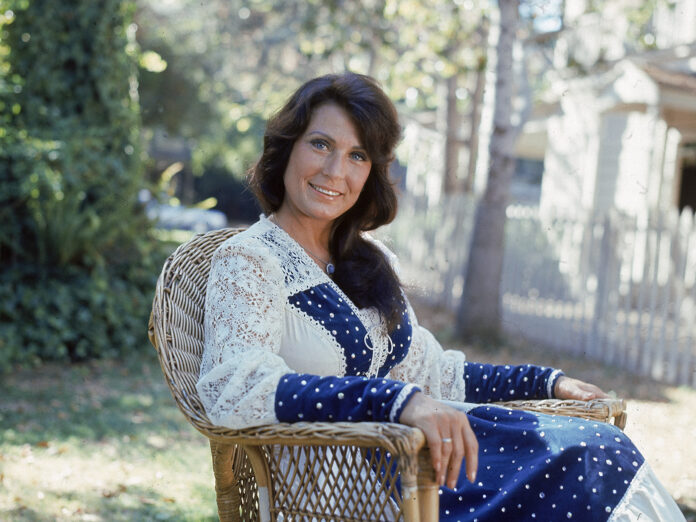From Uncut's March 2016 issue (Take 226). We meet the Queen of Country in her haunted Tennessee mansion and look back on her spectacular career...
Subscription Required!
Subscribe to Uncut+ to get access to our special members area where you’ll find every issue of Uncut stretching back to Take 1 in 1997 plus a comprehensive collection of our Ultimate Music Guides and other special editions. Browse issues from our archive in full and use our search engine to hunt down features and reviews in Uncut about your favourite artists
If you are already subscribe to Uncut+ or the print edition of Uncut magazine, simply login below.
Login
Don't have an subscription?
From Uncut’s March 2016 issue (Take 226). We meet the Queen of Country in her haunted Tennessee mansion and look back on her spectacular career…
Welcome to Hurricane Mills, the second-most-haunted house in Tennessee and, for the past 50 years, home of the supernaturally gifted Loretta Lynn. Here, the Queen Of Country Music looks back on her sparkling career, her wayward spouse, her legendary friends — from the Cash family to Jack White — and the spirits that surround her to this day.
There is no mistaking the route that leads to Loretta Lynn’s estate in Middle Tennessee. At five-mile intervals along the freeway that bisects the Volunteer State from East to West, there are folksy billboards showing the Queen Of Country Music in a red, checked cowboy shirt. Her head is tilted to one side, her well-appointed brown curls grazing her collarbone, while the hoarding invites you to “Visit the Legend Loretta Lynn in Hurricane Mills”.
In fact, more than 500,000 people come through the doors of Lynn’s antebellum mansion each year. Lynne recalls the Sunday afternoon in 1966 when she and her late husband, Oliver “Doolittle/Mooney” Lynn, got lost on the back roads of Humphreys County. “I seen that house and I said, ‘Doo, I want that house right there,”‘ Lynn explains. There was one problem, though: the house came with a whole town, including a working grist mill, a post office, a waterfall, a store and a gas station. But what Loretta wants, Loretta generally gets, as evidenced by a magnet on the restaurant-quality refrigerator in her airy open kitchen that reads, “When Mama ain’t happy, nobody is happy”. Is it true? Lynn takes off her rhinestone-encrusted reading glasses and says with a throaty chuckle, “What do you think?”
The couple didn’t waste much time putting a down payment on the 3500-acre town. Money wasn’t an object any more for the singer, who grew up poor in Paintsville, Kentucky. She’d released two albums that year. Hike ‘Em Country, which reached No 2 on the Billboard charts, and the vituperously autobiographical You Ain’t Woman Enough, which reached No 1, and whose title song became Lynn’s biggest hit up to that point. Based on a dalliance Doo was having with another woman, “You Ain’t Woman Enough (To Take My Man)” was a turning point for Lynn. The song’s true-to-life lyrics cracked with female empowerment and righteous indignation — something unheard of in country music in those less-enlightened times. Lynn continued to refine the theme in songs like “Don’t Come Home A Drinkin’ (With Lovin’ On Your Mind)“, “”Your Squaw Is On The Warpath“, “Rated X” and “Fist City“, where women didn’t just stand by their men, but stood up to them. Perhaps most radical of all, there was “The Pill” — which intimated that, with birth control, a woman had the same rights as a man. It was clear that Lynn was drawing from her own life and marriage in her increasingly bold songwriting. “I wasn’t doing anything — what did you call it? — revolutionary,” she insists. “I was just saying what everyone else was really thinking, but didn’t talk about it in public. It turned out, I was just the first one to write it like the women lived it.”
Today, Lynn is dressed in a sparkly pink shirt, tight velvet trousers and sequinned black house slippers. Lynn no longer lives in the antebellum mansion, but in a smaller property across the driveway. It is here that she sits in an oversized red leather sectional. As we talk, Lynn angles her head toward a bigger house that lies across an asphalt walkway. “It’s silly, I know, but I fell in love with the house because it reminded me of the house in Gone With The Wind. But you know, this place was never really a plantation. But I’ll tell you one thing, it is haunted.”
In fact, Lynn’s ranch has been certified the second most-haunted place in Tennessee. Located high on a hill, the 14-room property was built in 1845 and was used as a hospital in the Civil War. According to records at nearby Middle Tennessee State University, it was also the site of a Civil War battle on July 22, 1863, where 19 solders lost their lives. All of them are buried in a cemetery near the church erected on the property – one of three cemeteries on the 6,500 -acre estate. In the old part of the house lies the ‘brown room’, where Lynn’s eldest son, Jack Benny Lynn, slept and experienced his own visitation after coming home one night and falling asleep on his bed with his clothes on. He was woken by someone trying to remove his boots: a soldier dressed in an American Civil War uniform.
Does any of this bother Lynn? “No. If you’re good to the ghosts, they’re good to you,” she says.
FIND THE FULL INTERVIEW FROM UNCUT MARCH 2016/TAKE 226 IN THE ARCHIVE




